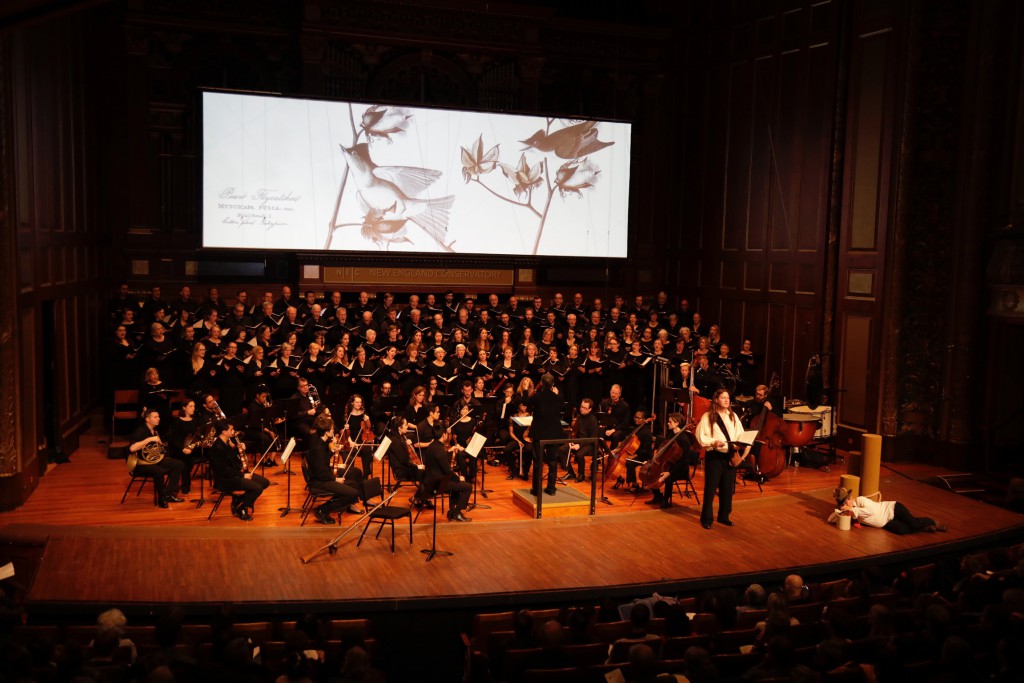Uneven “Audubon” premiere fails to take wing with Chorus Pro Musica

James Kallembach’s oratorio “Audubon” was given its world premiere by Chorus Pro Musica Friday night at Jordan Hall. Photo: Lorin Granger
A milestone season invariably brings a commemoration. Chorus pro Musica, which launched its 70th season Friday night at Jordan Hall is no exception.
But this year’s opening night concert, led by music director Jaime Kirsch, was not the usual nostalgic retrospective. Rather, it was dedicated to music of our time, with the world premiere of James Kallembach’s Audubon—a multimedia oratorio presented in partnership with Mass Audubon, which portrays scenes from the life of the great American naturalist and artist.
One doesn’t need to spend much time with Kallembach’s choral music to understand its appeal. His vocal writing is strongly idiomatic, always showcasing the choir in a flattering light. There are challenging passages – sinewy, unaccompanied chromatic lines, for instance, or exposed high-register writing – but they are smartly set up and comfortably resolved.
Indeed, the technical demands Kallembach makes on his vocal forces in Audubon never seem superfluous. They serve specific dramatic ends and set up subsequent striking gestures, rather than drawing attention to themselves.
The first of the oratorio’s two acts presents the ornithologist on the banks of the Mississippi River, about to embark on his exploits. Here he tells a slumbering drunk about his observations of birds before setting out. Several years elapse between this scene and Act 2, which places Audubon in an English salon, regaling his audience with stories of the American frontier in an effort to raise funds for the engraving and publication of his magnum opus, The Birds of America. Further underlying the latter act is Audubon’s strong desire to return home to his wife, Lucy.
Friday’s performance clocked in at just about an hour of music. While there is much to be said for brevity and concision, Audubon’s narrative felt reined in and unduly truncated.
Kallembach assembled his libretto from Audubon’s idiosyncratic writings, which lends a welcome directness to the texts. And there are some smart juxtapositions on display: for instance, in “The White-headed Eagle,” that bird’s violent nature is counterpoised with Audubon’s account of his own experiences with native outlaws and bandits.
But one doesn’t come away from the piece with as much insight into the man or his motivations as one might like. Surely there’s room for expansion – or a third act – to give sharper definition both to Audubon and the characters who participate in the tale (especially his spouse).
Kallembach’s score is generally diatonic. Some sections (like Act 1’s “The Wood Thrush” and “The Phoebe”) evoke Vaughan Williams’ modal, pastoral style. Others aim for a grander statement – something along the lines of Randall Thompson’s The Testament of Freedom, perhaps. The orchestral writing is often involved and colorful.
Still, while Kallembach’s writing is motivically unified – a jaunty, rocketing theme in the Overture figures significantly in several subsequent movements in both acts – one misses an overriding sense of compelling melodic character. His tempos are generally slower than not, and, overall, the oratorio might benefit from a stronger dose of counterpoint.
Only in Act 2 does it occasionally break free. A lovely “Entr’acte” – a solo flute accompanied by glockenspiel with lush string and horn chords underneath – leads to the earthy “The Eccentric Naturalist” and aforementioned “The White-headed Eagle.”
Does that make up for things? Somewhat, yes. But, ultimately, Kallembach’s score is too unoffending and a bit faceless as a result.
Still, there are some arresting episodes, as in the conclusion of Act 1’s “The Ruby-throated Humming Bird.” The final verse pays tribute to Audubon’s deceased infant daughter, Rose, with the choir humming a response to Audubon’s repeated iterations of “Oh, my Rose, my Rose!” At its climax, keening woodwinds join in a lament over an impassioned string refrain.
Dramatically, this is Audubon’s most potent moment, and was especially so on Friday as baritone Sumner Thompson sang the stratospheric concluding notes with perfect control and poise. Indeed, Thompson’s account of the title role throughout was delivered with strong voice, clear diction, and warm tone. One might quibble with his score-bound performance in this semi-staged production, but, musically, Thompson left a strong impression.
The same could be said for Chorus Pro Musica. The ensemble’s role in this piece was, ironically, more of a supporting than a leading one, but they blended well with Thompson’s Audubon and gave their best to the moments that showcased choir alone.
Kirsch drew singing of robust intensity and excellent blend from the choir in “O, Great Poet.” In “The Phoebe,” the chorus’s echoing accompaniment to Thompson’s lines were tight and lively. At times, the singers’ enunciation of texts in contrapuntal textures was vague, but the decisive moments in both act finales were strongly etched.
Orchestral accompaniments were engaged, though balancing at times uneven and a fuller string section might have provided more satisfactory weight to the sound and performance.But the group’s playing was robust and brimmed with vigor. Abe Finch made salient work of Kallembach’s involved percussion writing.
Kathy Wittman’s videos were Audubon’s multimedia element. Consisting of animations of birds in flight, as well as examples of Audubon’s striking illustrations and, at the end of each act, handsome river- and seascapes, they were subtle and effective.
Chorus pro Musica presents “A Candlelight Christmas” 8 p.m. December 14 at Old South Church. choruspromusica.org
Posted in Performances




